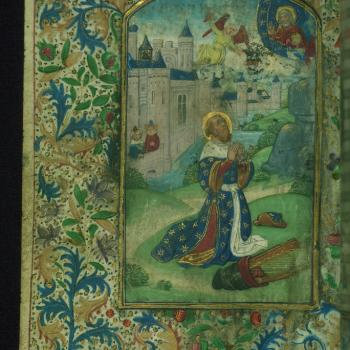When I entered the Church, I did so as the husband of a wonderful woman who, among other things, has always loved folk music. I’m wasn’t as big a fan as Jan is, but I do enjoy it and Jan’s love for it made me appreciate it more because it is music that means a lot to the woman I love. As a result, I came to appreciate in particular the handmade nature of folk music. It comes from ordinary people and their experience and is not manufactured by giant corporations. I suspect that’s one of the reasons the Church has long incorporated folk music into its hymnody. Indeed, when you read the Psalms or several passages from Paul–heck, the Magnificat–you are reading folk music.
When I entered the Church I found some of the folk hymns to be quite moving and others not to my taste. But since I am not one of those personalities for whom aesthetics is a massive obsession, I did not have strong views about hymnody. Because of this, I was somewhat taken aback with the surprisingly bitter contempt heaped on certain songs and, in particular, for the raging hatred so routinely poured out on ‘Kumbayah’. I’ve always kind of liked it and have been made to feel for 30 years as though sticking my neck out to say that was to invite the disgust of all Right-Thinking Catholics Everywhere.
But now pal Sherry Weddell sends this along:
“The story goes that Robert Winslow Gordon, a Harvard graduate who later became the first Head of the Archive of American Song at the Library of Congress, recorded the song in 1926. Henry Wylie was the singer and a member of the Gullah Geechee community. “Kumbaya” meant “Come by here” in Gullah and was a plea to God for help. In the interim years, missionaries and folk singers including Pete Seeger, Joan Baez and Odetta made the song popular around the world, but if we look closely at the lyrics, we see how similar they are to Negro spirituals. Negro spirituals or as African American scholar, W.E. B. Dubois called them, sorrow songs, were a cry for help. They were an important part of the oral tradition that allowed the enslaved to share their most intimate desires and needs with God. They were mostly Christian songs but also sometimes had a subversive message. Coded language in songs were used to help runaway slaves find freedom by means of the Underground Railroad trail. As such, these songs represented their hope for freedom and better days.”
She writes:
No, Kumbaya was NOT written by Anglo beatniks or hippies in the 60’s. It emerged from intense suffering of African American long before. Kumbaya was a “sorrow” song, a plea for help. (So I refuse to waste another nanosecond of time hearing some culture war conservative heap scorn on “Kumbaya”. Don’t waste your breath around me.)
Kumbaya was a cry to God from those whom the white Americans had enslaved: a cry to God like the Psalms, like the OT prophets. And they had earned the right to cry to God many times over.
I’m done feeling vaguely unclean for liking this hymn. If we take seriously the Communion of Saints at all, let alone our Lord’s command to take the side the least of these, this hymn speaks the heart of people, living and dead, to whom we owe an unpayable debt of suffering and an equal debt of gratitude. We should pray it with them. For God knoweth that we need his help for our sins, not least against them.











